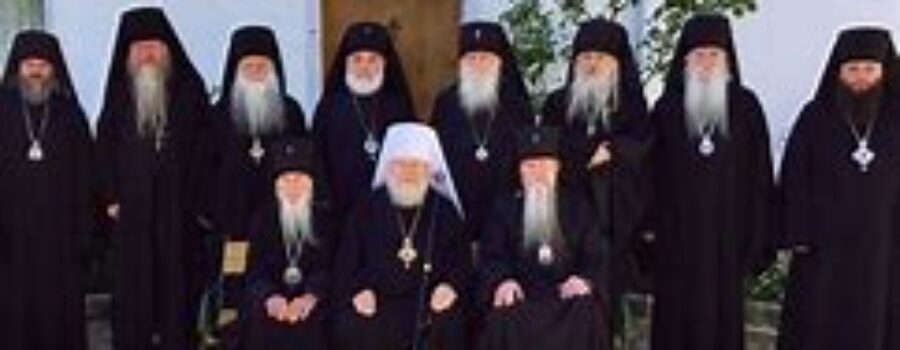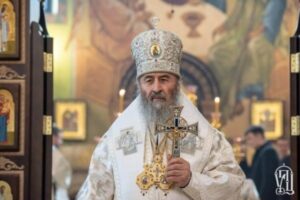This year will be one of great significance not only to our parish, but to all of our beloved Russian Orthodox Church Outside of Russia, which celebrates the centennial of its founding.
It is of historical interest and importance to note that ROCOR should never have come into existence in the first place, but did—by the Grace of God—for the spiritual nourishment of countless thousands forced to flee our Russian homeland as a result of the Bolshevik Revolution of 1917 and the frightening purges and attacks against the Church and Her God-fearing members that claimed millions of innocent lives during the decades following. There are some who feel that there is no reason to “celebrate” a split within the Church or the events that caused it. The reality is that the hierarchs of blessed memory, along with the faithful of the Russian Orthodox Church Outside of Russia always considered ROCOR to be a living part of the Mother Church in Russia, separated only by historical circumstance, but not spiritually. Our First Hierarch, Hilarion, Metropolitan of Eastern America and New York, clearly explains the understanding of this unprecedented relationship and the meaning of this year’s centennial commemoration in this excerpt from his 2019/2020 Nativity Epistle:
“May this New Year become a time of God’s goodwill and His almighty aid; may He renew and strengthen our abilities to offer up thanksgiving to Him as is meet, and to commemorate our forebears in this jubilee year of the centennial of the Russian Church Abroad!
“How was the Russian Church Abroad formed? In November 1920, though defeated, many Russian Orthodox people did not surrender, and left their beloved nation’s borders; hundreds of thousands of officers and soldiers, Cossacks and peasants, landowners and workers went into exile. Departing with them were the clergy who nourished them. The archpastors and clergymen did not depart in disarray: still in the homeland, with the blessing of the Holy Hierarch Tikhon, Patriarch and Confessor of All Russia, they formed the Provisional Supreme Ecclesiastical Authority of South-Eastern Russia.
“Finding themselves abroad, what could these representatives of the Russian Church do? Guided by love for the persecuted Mother Church and Canon 39 of the Sixth Ecumenical Council, which addresses a similar situation, when part of the population of Cyprus had to leave their country, having ‘been freed from heathen slavery,’ the Russian hierarchs formed the Supreme Ecclesiastical Administration Abroad. Moreover, after this, the Holy Hierarch Tikhon and the Holy Synod over which he presided sent the departed émigré masses the famous Directive № 362, dated November 7/20, 1920, which proved to be God-inspired. The hierarchs abroad took the first steps of their unique service in Constantinople, having received a blessing from the Locum Tenens of the Ecumenical Throne, Metropolitan Dorotheos (Mammelis), who at the time respectfully wrote to Metropolitan Anthony (Khrapovitsky) of Kiev and Galicia: ‘the Patriarchate permits any undertaking under your direction, for the Patriarchate knows that Your Eminence will commit no uncanonical act.’ Later, this Supreme Ecclesiastical Administration Abroad, reformed into the Russian Church Abroad, was transferred to Serbia, where it found itself under the truly fraternal aegis of the Serbian Orthodox Church, with whom we now share fathers and preceptors.
“In 1924, when Patriarch Gregory VII of Constantinople declared his support for the Living Church schism and demanded that the Holy Hierarch and Confessor Tikhon ‘immediately depart from administration of the Church,’ many understood the fervent desire of the hierarchs of the Russian Church living abroad not to merge into the existing Local Churches, but to strive in every way to preserve their living and organic ties to the persecuted Church in Russia. Since that time, the Russian Church Abroad has followed the life of the Church in the homeland with a keen, loving, and devoted eye, rejoicing in her successes, sorrowing in her tribulations, and loudly bearing witness to her sufferings, piously reverencing the ascetic and martyric struggles of those who fearlessly went to their deaths in the name of Christ.
“Marking this glorious anniversary, which will continue with the celebration of the First All-Diaspora Council next year, we intend to celebrate neither the terrible events, as a result of which many Russian Orthodox people found themselves on foreign soil, nor the bitter division of the Mother Church, which had been subjected to persecutions.
“The primary goal of our celebration is to lift up thanksgiving to God, Who bountifully poured out upon us His abundant mercies, and to prayerfully honor our forebears, who in complex conditions abroad held aloft the standard of our Holy Russian Orthodoxy, and relayed to us a great inheritance. May the lamps on their graves never be extinguished! Moreover, every anniversary must cause each of us to once more take interest in our history, and consider the individual people whom we commemorate. Only this approach to the jubilee celebration, combined with prayer and a humble hope in God’s aid, will grant us a renewal of our hearts, of all of our strengths, and of all of the paths of our modest service to God and man.”
We have indeed received a great inheritance from those who brought Holy Orthodoxy to us here in America and around the world. Our church here in Santa Rosa is a part of that great inheritance entrusted to us. Let us contribute to the celebration of this great gift of our faith and honor our archpastors and pastors, grandparents and parents, who have been our spiritual benefactors, by preparing ourselves and our spiritual home for the Full Consecration of our church, to continue the good work they began and entrusted to us, and to pass this great inheritance on to our children and our children’s children for generations yet to come!
God bless! Fr. Alexander


